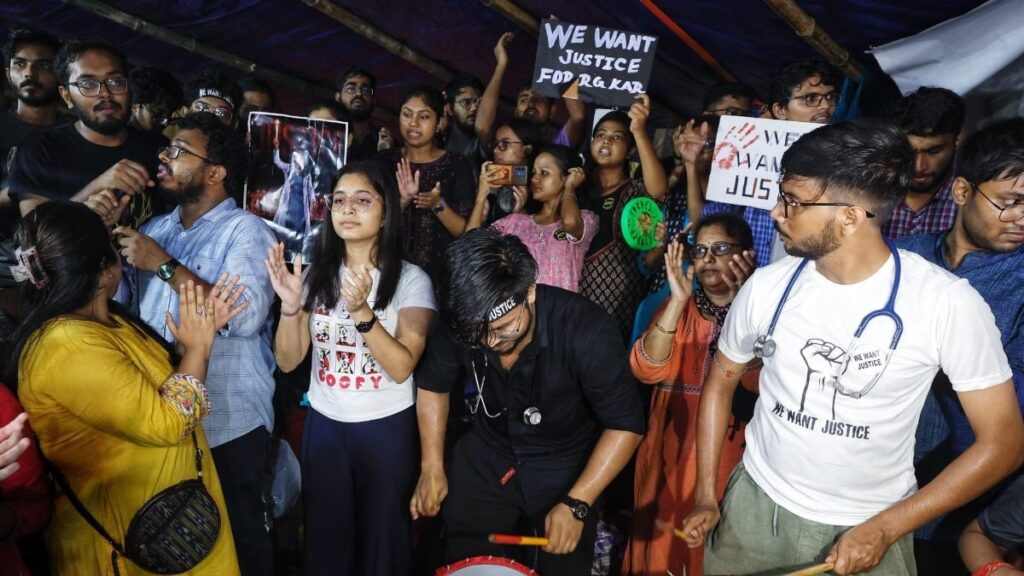Mamata Banerjee’s trademark style of politics is taking causes close to her to the streets — a move that helped her oust the Left government after a 34-year rule in 2011. Since then, the West Bengal chief minister is not known to back down from a fight — until now.
Cut to 2024 and street politics has returned but, this time, it’s the chief minister who is on the back foot with the state’s doctors adopting her trademark style of protesting on the roads against the brutal rape and murder of a 31-year-old trainee doctor at RG Kar Hospital.
The 35-day strike by the doctors, followed by seven days of dharna, forced Banerjee to change the Kolkata commissioner of police; North Kolkata deputy commissioner; Director, Medical Education (DME); and Director, Health Service (DHS) — all demands put forth by the protesters.
Sources said the government was in no mood to reshuffle top officials but was forced to buckle under pressure.
On Monday, the two-hour-long meeting between the chief minister and junior doctors ended at around midnight. This was followed by over two hours of writing minutes of the meeting — another reminder of the fact that this time, Banerjee did not have the upper hand.
The horrific incident at the state-run hospital on August 9 triggered massive protests the same day as doctors accused the hospital authorities and police administration of trying to cover up the crime. They also demanded enhanced security for doctors.
Amid the protests, the students also levelled allegations against the principal of the college, Sandip Ghosh, accusing him of running a threat syndicate under which students were forced to pay up to pass in exams.
Soon, the CBI took over the rape and murder case as well as a financial irregularities case against Ghosh who was eventually arrested by the agency. The students, however, refused to relent and put forward five demands.
What were the demands?
The students wanted the murder case to be expedited so that justice could be ensured for their colleague. Apart from this, they sought Ghosh’s suspension with disciplinary proceedings and action against all those involved in tampering with the evidence. The students also demanded the removal of DME, DHS, and Health Secretary along with Vineet Goyal, Commissioner of Police, and disciplinary action against DC North and DC Central.
The students also sought adequate security in hospital premises, separate washrooms for doctors, and an end to “threat culture”.
Apart from the removal of the health secretary and departmental proceeding against DC Central, Banerjee accepted all the demands of doctors.
“We have discussed at length about their issues. I have accepted almost 99 per cent of their demands. We are older so we have listened more to what they demanded. I have requested them to go back to work,” she said after the meeting.
Students, on the other hand, returned to the dharna site and though they claimed “moral victory”, they said they will return to work when orders are passed to remove the complicit officials.
Unrelenting Protesters
Sources say it was the relentless pressure created by the protesting doctors that forced the government to bow down in front of them. The agitation for justice, which gained momentum after the hospital premises were ransacked on August 14, spread beyond RG Kar and became a pan-India movement.
In a first under Banerjee, the common man took to the streets, with women taking part in large numbers to “reclaim the night”. From intellectuals, film stars, IT professionals, to rickshaw-pullers and cab drivers — all stood by doctors.
The doctors also sat for about 20 hours outside the Kolkata Police headquarters, scaling up their agitation as they demanded the commissioner’s resignation. They presented a model of a spine to the police commissioner, questioning why he should continue on his post.
They also refused to back down when the Supreme Court ordered them to join work by 5pm on September 10. Instead, they planned a march to the health department with five demands and held a dharna for seven days.
Last Thursday, when Banerjee finally agreed to meet the students, they decided to return as the government did not allow live-streaming of the meeting. An exasperated chief minister went to the dharna site and tried to reason with them after which the second meeting was fixed on Saturday. The meeting was once again rejected by the students on the issue of live-streaming. Finally, it was on the 16th that the meeting happened, with the government accepting the students’ demands.
As Tenacious as Banerjee
When Banerjee was in the Opposition, just like the protesting doctors, she refused to give up unless her demands were met. The return of land to farmers in Singur was one such case where Banerjee proved everyone wrong and overturned the decision. More than 16 years ago, Banerjee once again hit the streets over the unnatural death of a man named Rukbanur Raheman in which a police commander was in the dock. Ultimately, the official was removed from his post owing to the pressure.
Experts say the doctors’ apolitical movement, which was backed by common people, put pressure on the Banerjee government and forced her to act. Experts also say the Opposition should learn lessons from the movement on staying united till the ultimate goal is achieved.

